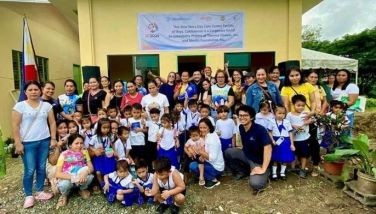Half a century of O.B. Montessori's part in the national reconstruction of Philippine society
(Part I)
For half a century we have experienced the joy of helping brighten up the current social condition of the Philippines and upheld what Max Soliven often cited, “faith in the Filipinos.” This has helped balance the depressing news the media daily proclaims – such as deteriorating education, weakened family ties, economic disparities and human dislocation and suffering caused by rebel wars and widespread environmental degradation.
UNESCO’s preamble states, “War starts in the minds of men. It is in the minds of men that the defenses of peace must be constructed” – with the right kind of EDUCATION. The vast majority of human beings on this planet do not want war, yet wars come. “The causes of war,” Dr. Montessori stressed in a lecture on Education and Peace at the League of Nations at Geneva in 1926, “are not those which appear on the surface. They lie deep down in the collective subconscious of humanity. A vital factor has been left out in the building of our civilization – the CHILD as the creative constructor of society.”
The child, considered of zero economic value
Within the century, the child has been considered a non-entity, a plaything, a disturber of the peace. It is only when he enters Grade I, that he gains economic value. Childhood has an importance of its own. In fact, Dr. Montessori continued “it is the other pole of humanity” filled with an immense treasure. Unfortunately conventional education has blocked it. And because of this, “humanity may be compared to that of a man trying to advance on one leg instead of two.”
On its 45th anniversary this year, O.B. Montessori Center would like to look back how Dr. Montessori’s system has helped us unlocked the childhood’s hidden treasure that has made us realize “the emergence of the new man, who will no longer be the victim of events, but one who molds and shapes the future of the Philippines.”
1960 - return from Saigon, help in relocation of 3,000 squatter families from Intramuros
Half a century ago in 1960, I have just returned from Saigon where my husband Max was an adviser to the Vietnam Press, a correspondent for Newsweek and New York Times. It was a fulfilling stay for I was teaching at Khai Minh Primary School and the Jesuit Highschool at Cholon.
Back in Manila, I taught half day at Telly Albert’s San Lorenzo Preschool in Makati where I met Elsbeth Graemigher, a Swiss Montessori teacher. She converted me to the Montessori system by transforming my hyperactive Australian pupil Patrick Fenton to an obedient orderly child. Apparently, Patrick found the play school program quite boring to suit his superior IQ.
The OBI president, Oscar Arellano had just helped relocate 3,000 squatter families from Intramuros to Sapang Palay. He challenged me to organize a preschool for the children so their parents could concentrate on learning livelihood skills to sustain their lives. We did the same in Taal, Lemery, where OBI relocated the Taal Volcano refugees.
Then Italian Ambassador Rubino offered me an Italian borsa di studio to master the Montessori preschool teacher training in Perugia. Later Ambassador Solera let me continue the training at the Bergamo Center for elementary school teachers. To sample the Montessori highschool curriculum, Ambassador Fedele arranged a travel grant to visit “scuola professionale” of Florence, Venice and Milan. With a limited budget, OBI rented old spacious mansions. Thus the first OB Montessori preschools were in the Paco mansion of the Cu-Unjiengs, the Rufino house on Taft Avenue, the Madrigal house in Gilmore, Mapa residence in Forbes Park, Lichauco compound, beside the Jesuit Xavier House along Pedro Gil and the Lacson mansion in Angeles, Pampanga.
1966-1972 – media stirs public interest in the Montessori system
Leading female journalists like Nang Sevilla, Doris Nuyda, Betty Belmonte and Gelly Mendoza wrote complimentary columns about the “preschoolers who were so concentrated in doing puzzle maps of the world, laying out the Golden Decimal beads as well as setting the table with breakable plates and using real small iron without thought of playing.” Just before Martial Law was declared, Geny Lopez gave me a thrice a week ABS-CBN TV slot (1970–1972) to show the Montessori classroom at work. It rated 17th among 400 weekly shows catching the B and C class, for I speak English simultaneously with Filipino. This enabled the whole country from Luzon, Visayas to Mindanao to discover the “new children” who love work and order and together with them, the “new teacher.”
In spite of Martial Law, we put together the Pagsasarili preschool, the affordable version for the poor in seven improved slum areas of Metro Manila with the NHA (National Housing Authority) Chairman, Gen. Gaudencio Tobias. In Negros Occidental, our Pagsasarili Community and Child Foundation managed to organize 17 Twin Literacy projects for village mothers and their children in partnership with sugar hacienderos like Punay Kabayao Fernandez and Mayors Rowena Guanzon and Joseph Marañon.
1986-2010 – UNESCO gets acquainted with the Montessori system
During President Corazon Aquino’s governance in 1986-1987, I was sent to represent the country at the UNESCO Executive Board in Paris. With the help of my daughter Sara, the Montessori Pagsasarili exercises were demonstrated to the secretariat of the Executive Board by the UNESCO preschoolers at Rue Miollis, while the apparata for functional literacy of village mothers were put on exhibit. This program received the 1993 international UNESCO Literacy award in New Delhi, India.
In 1990, UNESCO Education for All (EFA), the global program for literacy was declared coinciding with our country ratifying the Convention for the Rights of the Child (CRC). This prompted both Congress and Senate to do a complete survey of the whole educational system in the Philippines. Known as EDCOM, it was led by Senator Angara, who summarized the study in the book “A Nation in Crisis.”
1995-1998 – The O.B. Montessori College, restaurant and Tagaytay farm
Our OBMC Professional Highschools were well established, with each one running a bistro to fulfill the Montessori highschool students’ quest for economic independence. To prevent the mushrooming of false Montessori schools, we set up the Montessori teacher training college, offering culinary service as well. For apprenticeship, the Italian Ristorante La Dolce Fontana was set up in the ground floor of the four building complex at the corner of Eisenhower and Annapolis. Moreover, with a MOA with Kasetsaart University of Bangkok, the multi-crop Alfonso farm, patterned after the Thai King Bhumibol Adulyadej’s self sufficiency farm was designed by Prof. Charuphant. This 16-hectare upland farm lies on the border of Tagaytay and Sulsugin, Alfonso.
The delayed maturation of Filipinos
Generally, it takes 24 years to develop an adult; one who is capable of supporting himself. Pathetically, it takes an average of 30 years in the Philippines. Why this delay? There are three major reasons – sociological, educational and political.
Too many crutches deprive us of our strength of character. Continuous dependence within the “extended family” system cripples Filipino children psychologically. This is further aggravated by the politicians, who prevent the sustainable development of the under-privilege citizens by constant dole-outs. Abundant scholarship grants are awarded without being merited. Education is still largely concentrated on the mind, instead of unfolding character and personality.
Fortunately, more schools have started to break the mental blocks by providing more active experiences instead of mere reading and writing. This realistic environment of work and learning have freed children to become self- reliant.
(Erratum in last week’s column: The Italian phrase “Un mondo novo” should have spelled “Un mondo nuovo”, which means a new world.)
- Latest





























